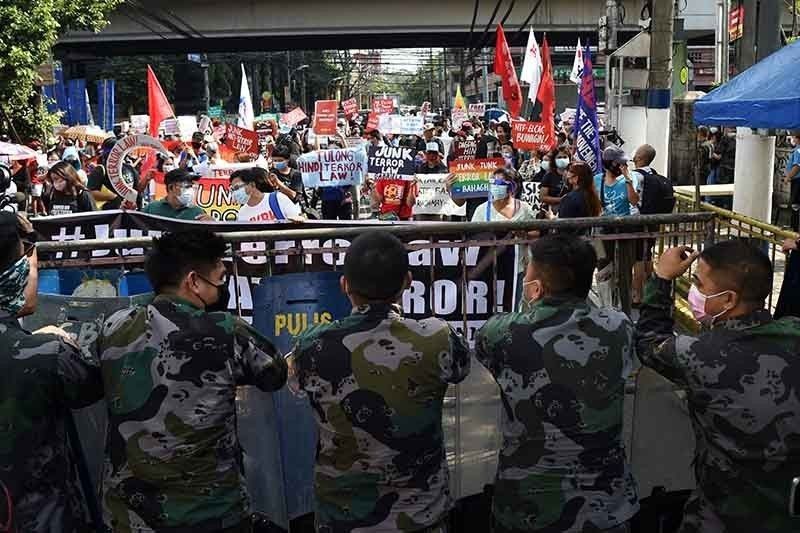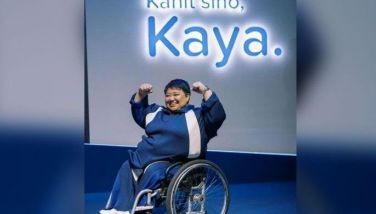Citing relentless red-tagging and arrests, SC urged to temporarily stop anti-terror law implementation

MANILA, Philippines — In another show of unity, petitioners against the Anti-Terrorism Act of 2020 made another push to urge the Supreme Court to temporarily stop the implementation of the reviled law as debates on their pleas continue to run long.
More than 20 petitioners filed a joint reiterative motion for temporary restraining order. They again prodded the SC to issue a status quo ante order, TRO and/or writ of preliminary injunction final disposition of their petitions on merits.
The SC had earlier listed whether a TRO or Status Quo Ante Order should be issued as one of the issues to be tackled in the oral arguments. The court had said it will defer action on petitioners' prayer for injunctive relief until the end of the debates.
RELATED: 'Time is of the essence:' 23 petitioners urge SC to stop implementation of anti-terrorism law
But petitioners, in this fresh pleading, raised several “supervening events” that they claim “are indicative of the Government’s ‘spirit of hostility, or at the very least, discrimination that finds no support in reason’ with which it will implement the vague and overbroad terms of the ATA.”
Reiterating University of the Philippines law professor John Molo’s point in the oral arguments, the petitioners again stressed that the ATA infringes upon at least 15 of the people’s fundamental rights, among these freedom of speech and expression, as set forth in the Constitution.
“As an unprecedented statute that transgresses the People’s right to freedom of speech and expression as well as a majority of the guarantees of the Bill of Rights, the ATA is tainted by a ‘heavy presumption against its constitutional validity,’” they said.
Citing the 1998 case of Ople v. Torres, the petitioners raised that the SC has held that “when the integrity of a fundamental right is at stake, this court will give the challenged law, administrative order, rule or regulation a stricter scrutiny.” The 1998 case also held that authorities must “satisfactorily show the presence of compelling state interests.”
“As the ATA is presumed invalid pending resolution of this case, the Honorable Court has the power, if not the duty, to restrain its implementation until the Government meets its burden and justify the ATA’s constitutionality,” they said.
“It stands to reason that the government must be restrained from implementing a law which is presumed unconstitutional. Perforce, the enforcement of the ATA must be placed on hold pending final adjudication of the 37 petitions,” they added.
READ: Justices ask: Has the anti-terrorism law 'chilled' petitioners into silence?
Red-tagging, threats of prosecution and arrests
Among these supervening events that petitioners cited are the “threats” from high-ranking officials of the National Task Force to End Local Communist Armed Conflict, Lt. Gen. Antonio Parlade Jr. and Communications Undersecretary Lorraine Badoy.
They noted that Parlade referred to the petitioners, in a Manila Times article published February 12, as “a friend, if not actually a supporter or member, of the communist and terror groups.” The military general had also accused Inquirer.net reporter Tetch Torres-Tupas of writing “propaganda” and even implied that she may be charged with violation of the anti-terrorism law for “[a]iding the terrorists by spreading lies.”
Badoy, meanwhile, had called members of the National Union of Peoples’ Lawyers, who represent ten groups of petitioners, as bastards” who “bend” the law “to suit the agenda” of the Communist Party of the Philippines-New People’s Army-National Democratic Front.
Religious and Indigenous Peoples’ groups have not been spared of baseless linking to terrorists groups, the petitioners said, citing the red-tagging of Rural Missionaries of the Philippines Salugpongan Ta’ Tanu Igkanogon Community Center, and petitioner Bishop Reuel Norman Marigza.
They also raised the arrest of two of their fellow petitioners, Windel Bolinget and Char Errol Booc, which showed that those who are “similarly outspoken in their advocacy and dissent, are under imminent and credible danger of prosecution with the enforcement of the ATA.”
Cordillera Peoples Alliance head Bolinget was arrested over a murder charge stemming from a March 2018 incident, while Alcadev teacher Booc was nabbed in a raid in a Cebu university as police claimed Lumad children were being trained for warfare—the Commission on Human Rights’ regional office and social workers have denied this claim.
The petitioners had also cited the Department of National Defense’s unilateral scrapping of its accord with the University of the Philippines that keeps military out of the school campuses sans permission and the erroneous red-tagging of UP graduates.
While Defense Secretary Delfin Lorenzana apologized for it, “this has clearly produced fear not just in the implicated persons but also in many alumni students and officials of UP.”
Although the SC had rejected Aeta farmers Japer Gurung and Junior Ramos’ bid to also stand as petitioners, they raised to the court that the two had been detained for 21 days without waiver—which had invoked Section 29 of the contested law.
RELATED: Calida says 2 Aeta farmers wish to withdraw petition to join fight vs anti-terrorism law | P1,000 bribe to Aeta farmers? NUPL clarifies kin sent money, veggies
The petitioners pressed: “Indeed, ‘a continuous violation of constitutional rights is by itself a grave and irreparable injury that this or any court cannot plausibly tolerate’ and that in cases of violation of constitutional rights, courts are ‘duty-bound’ to act ‘intrepidly’ and grant injunctive relief posthaste to protect constitutional rights.’”
Citing SC’s own landmark ruling in Chavez v. Gonzales, the petitioners pleaded: “[A] blow too soon struck for freedom is preferred than a blow too late.”
The SC will resume oral arguments, its fourth session already, on March 2.
- Latest
- Trending





























